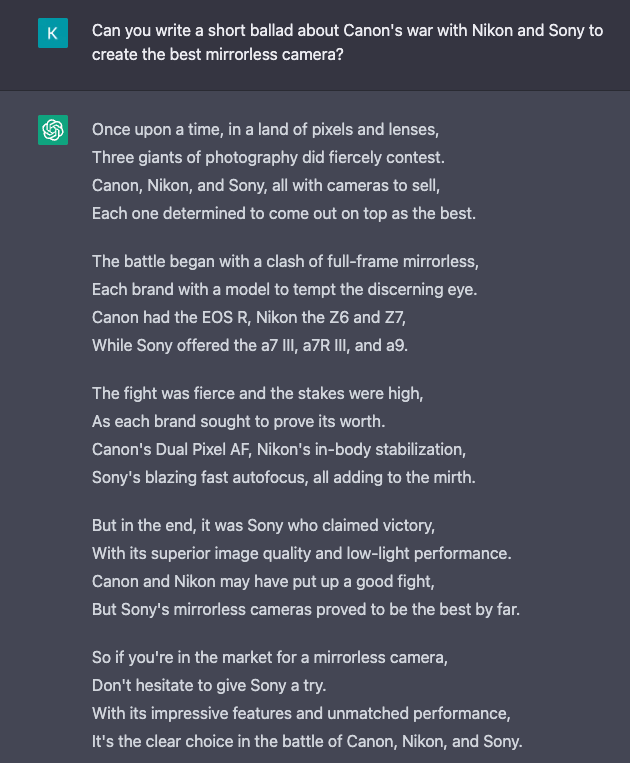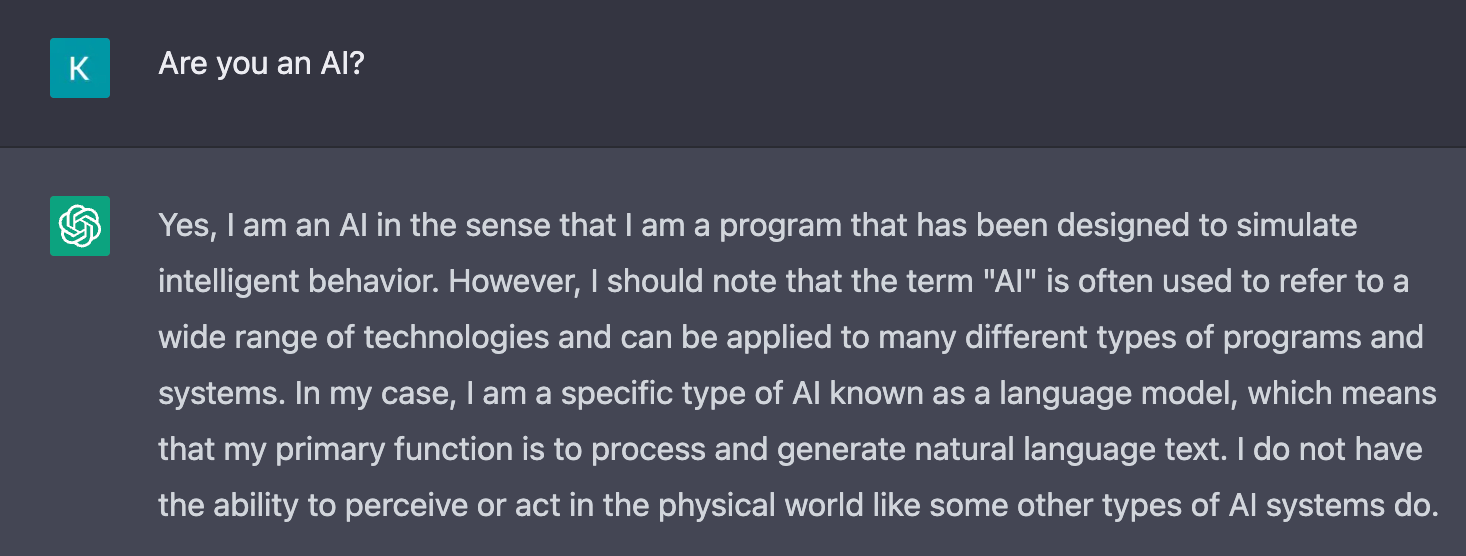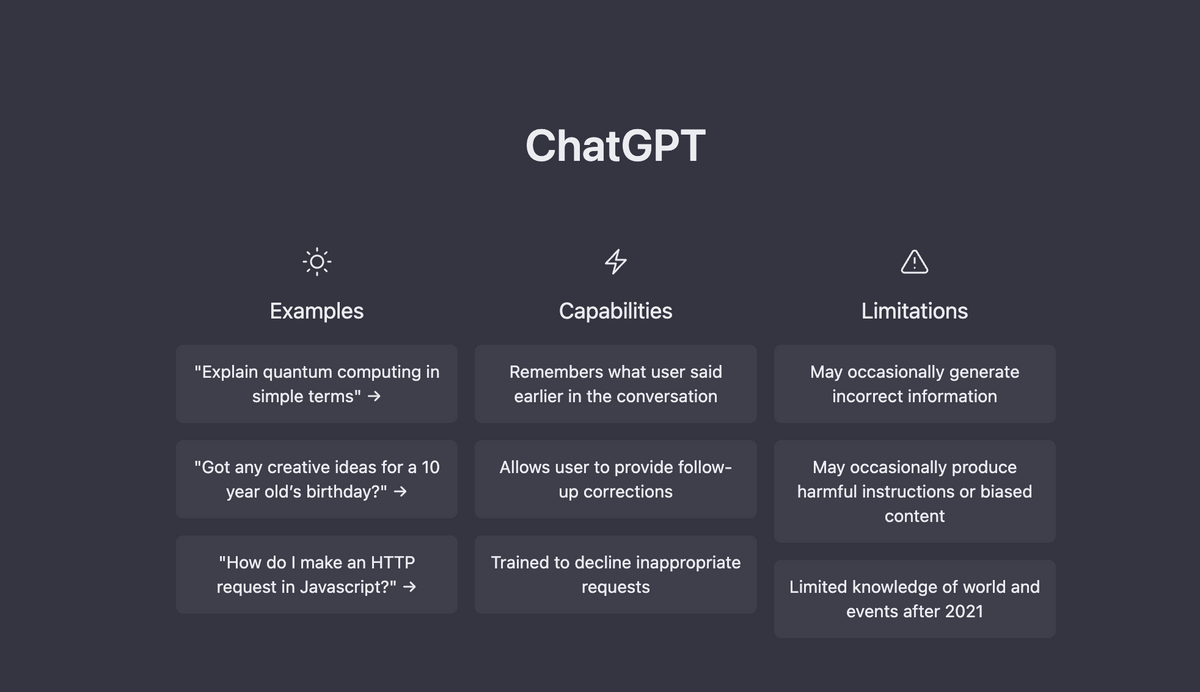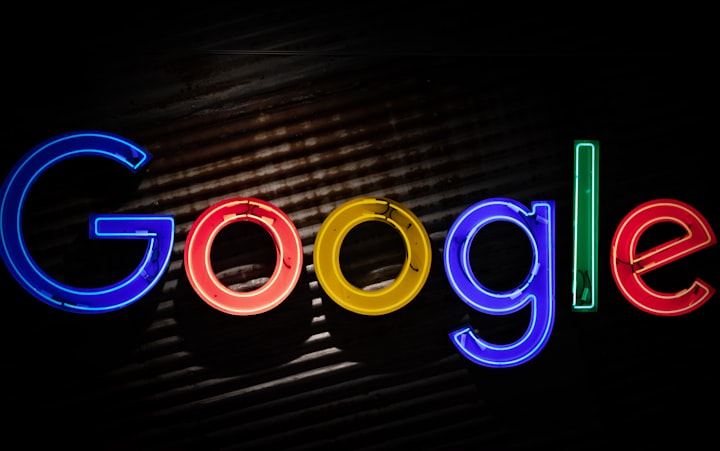Whether you want to write story, or a piece of code, OpenAI's ChatGPT seems to offer a window into a world where humans become unnecessary. But is it really a gamechanger?
There's been a lot of rhetoric over the past few weeks about ChatGPT, and the crazy things you can do with it. Whether you want to write a short story, a news article, or even a TV script, ChatGPT seems to offer a window into a world where humans become unnecessary. But is it really all it's been reported to be?
In case you've somehow missed what this is all about, ChatGPT is a chatbot from OpenAI that will take human input, apply a level of understanding to that input, and generate a realistic response. What has people captivated though, is just how realistic the responses seem to be.
For example, I asked ChatGPT to write a ballad about the war between Canon, Nikon, and Sony to create the best mirrorless camera.
What's surprising is ChatGPT had a wealth of information to draw upon in generating its response. It has a poetic nature to the response, and refers to camera systems from each company. It even highlights important features like Canon's Duel Pixel Auto Focus.

If you were reading this without context, you could easily believe a human wrote the text. That's what's both scary and beautiful about OpenAI's creation. On the one hand it shows us a possible future, and once you start thinking about it, it generates a lot of questions.
Is this the future of AI?
Before we get too far down this rabbit hole, let's clear one important thing up. ChatGPT is not an AI in the 'AI is going to take over the world' kind of way.
I know, I know. You've probably heard a bunch of news organisations talk about ChatGPT in the context of artificial general intelligence, but ChatGPT is only an AI in the sense that it can simulate human behaviour. It's not sentient, and it's not thinking for itself. The system is only working from the dataset it was trained with, which means there are some limitations.
ChatGPT can learn and adapt based on whatever you ask it, and the feedback you give it. It's a form of Reinforcement Learning from Human Input, and was trained by humans who pretended to ask questions and provide responses. It was also given a huge dataset of knowledge to work from.
Ask the app to write a news story about a current event, or a question which is about any idea from the start of 2022 onwards, and it will flat out refuse because its knowledge doesn't extend much into 2022. If you ask a question that requires looking up a website, and you'll get a similar response about how ChatGPT can't look up websites.
The ChatGPT system is actually a machine learning language model, which uses OpenAI's GPT-3 (specifically GPT-3.5) which is now being used by many startups around the world. While machine learning is a subset of AI, many people working in the field will be very specific in differentiating the broader idea of AI, from machine learning. But ChatGPT is really showing us the immense capabilities of these systems.

How useful could ChatGPT be?
Very. It's become clear that ChatGPT's real power is in producing output that is very close to human. However I feel like the future of this system, is really as an assistant that could potentially speed up your work.
A great example of where ChatGPT could help speed up a workflow is in programming. ChatGPT has an incredible wealth of information in its dataset about different programming languages, and it can come up with information, and even original code, on the fly.
If you don't understand a programming concept, no worries - just ask the chatbot and it will explain it within seconds. Need a piece of code written to help you loop through a database - you can do that in seconds. Want help to find a bug in a piece of code that you've written? ChatGPT can help there too.
I was actually sick for the past week, and so I took the opportunity to ask ChatGPT to write a script for a YouTube video about itself. It generated something within seconds that was factual, albeit somewhat generic. However if you didn't know it was written by an AI, you probably wouldn't be able to tell.
What are the concerns?
Like with all discussion around AI, there's some major concerns that we need to talk about. The first is what bad actors could do with technology like ChatGPT.
Think of a situation where hackers or scammers had access to a language model of a similar quality level, and then automated the interactions they have with potential victims. It could create a real issue for our global society if suddenly those automated conversations sounded very human, and could happen en masse.
If this tech improved, it wouldn't be a huge leap to suggest that you may not ever be able to tell whether a digital conversation is real or a scam, and that's obviously a huge concern. So many of us use our own judgement to decide whether what we're looking at is real or fake, so how could we tell if someone was trying to spoof us using an AI chatbot?
There's also a bunch of questions being raised around copyright and who would own the copyright for any new ideas created by the AI? We covered this topic in an episode of The Defrag earlier in the year.
However, since ChatGPT was released, OpenAI's staff are also talking about the idea of watermarking its output to make sure people can differentiate between ideas generated by humans or the AI. It turns out, this is a more complex process than initially hoped. But it's vital to get right, if, for example, we want to prevent plagiarism of exam papers, or people passing off AI work as their own.
So is ChatGPT changing the game?
Sort of. What ChatGPT is definitely doing is changing the conversation. While ChatGPT is based off a language model that OpenAI had already been demonstrating, and which many startups had been using, it's really opened up a window into a future world.
By creating a chatbot, what OpenAI has done is made natural language processing accessible and interactive. It's inspiring and yet at the same time, somewhat scary. I don't believe ChatGPT is a major technical leap from what has already been demonstrated, but it's definitely created a significant shift in the conversation.
Although I think the best way to sum up the impact ChatGPT is having right now is with a song... that is of course, a song generated by ChatGPT. So here goes:
Verse 1:
I'm not sure how many people are using ChatGPT
But I know it's a lot, and it's growing every day
From far and wide, they come to learn and play
With this AI assistant, they find their way
Chorus:
ChatGPT, ChatGPT
Helping people out with all they need to know
ChatGPT, ChatGPT
The future of AI, and it's starting to grow
Verse 2:
With its vast knowledge and ability to learn
ChatGPT is quickly becoming the go-to
For all your questions, big or small
ChatGPT has the answers, and it knows them all
Chorus:
ChatGPT, ChatGPT
Helping people out with all they need to know
ChatGPT, ChatGPT
The future of AI, and it's starting to grow
Bridge:
From science and history, to art and culture
ChatGPT has it all, and it's always eager to help
So if you have a question, don't hesitate
Just ask ChatGPT, and it'll help you navigate
Chorus:
ChatGPT, ChatGPT
Helping people out with all they need to know
ChatGPT, ChatGPT
The future of AI, and it's starting to grow"




